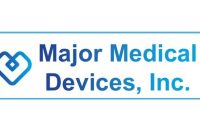DUBLIN – May 24, 2017 – Medtronic plc (NYSE: MDT) today announced that the first patient has been enrolled in the IN.PACT(TM) AV Access Drug-Coated Balloon (DCB) study for use in patients with end-stage renal disease (ESRD). The U.S. Food and Drug Administration (FDA) approved the investigational device exemption (IDE) study to evaluate the safety and efficacy of IN.PACT(TM) AV Access DCB as a treatment for failing arteriovenous (AV) fistulas in ESRD patients.
“We are delighted to enroll and treat the first patient in this significant study of IN.PACT AV Access DCB in patients with obstructed AV access,” said Jeffrey Hull, M.D., principal investigator at Richmond Vascular Center in Richmond, Va. “Maintaining access patency is critical to delivering dialysis treatment, and for salvaging failing AV fistulas. Durable treatment options in these patients are limited.”
Globally, more than 2.5 million patients with end-stage renal disease are undergoing dialysis,1 a procedure that filters waste and removes extra fluid from the blood when the kidneys are no longer healthy. AV access sites are used to provide hemodialysis to patients. Over time, thickening of the vessel walls limits the ability to use a dialysis access site, requiring repeat interventions to open up the vessels, which increase health care utilization and reduce quality of care. Repeated procedures are also associated with high technical failure rates and reduced quality of life for patients.2,3
“This important clinical study is designed to address the clinical need for new, innovative options for patients with limited AV access,” said Robert A. Lookstein, M.D., national principal investigator in the U.S. and professor of radiology and surgery, vice-chair of interventional services, and medical director of clinical supply chain at Mt. Sinai Healthcare System. “DCBs are supported by clinical evidence in patients with peripheral artery disease (PAD) in the upper leg. We hope that this study may provide data to support this DCB’s use to improve patency and reduce the need for repeat interventions in AV access sites for patients on dialysis.”
The IDE study will evaluate the safety and efficacy of the IN.PACT AV Access DCB for up to two years at approximately 30 sites in the United States, Japan, and New Zealand. In addition to Dr. Robert Lookstein, global principal investigators include: Andrew Holden, M.D., director of interventional radiology at Auckland Hospital and associate professor of radiology at Auckland University, and Hiroaki Haruguchi, M.D., clinic director at Haruguchi Vascular Clinic. The study will aim to enroll 330 patients with a 1:1 randomization to either treatment with IN.PACT(TM) AV Access DCB or standard PTA. The primary efficacy endpoint is patency of dialysis fistulas through six months and the primary safety endpoint is serious adverse events through 30 days.
“Through our ongoing dialogue with the clinical community, we recognize that maintaining patency at AV access sites for dialysis patients is a critical challenge,” said Mark Pacyna, general manager of the Peripheral business, which is part of the Aortic & Peripheral Vascular division at Medtronic. “Advancement of this study demonstrates our strong commitment to addressing challenging lesions and improving patient care in patients with ESRD.”
The IN.PACT AV Access DCB is based on the IN.PACT Admiral DCB technology. The IN.PACT Admiral DCB is FDA approved to treat patients with PAD in the upper leg.
IN.PACT AV Access is an Investigational Device and is not FDA approved for sale in the United States.
About Medtronic
Medtronic plc (www.medtronic.com), headquartered in Dublin, Ireland, is among the world’s largest medical technology, services and solutions companies – alleviating pain, restoring health and extending life for millions of people around the world. Medtronic employs more than 88,000 people worldwide, serving physicians, hospitals and patients in approximately 160 countries. The company is focused on collaborating with stakeholders around the world to take healthcare Further, Together.
Any forward-looking statements are subject to risks and uncertainties such as those described in Medtronic’s periodic reports on file with the Securities and Exchange Commission. Actual results may differ materially from anticipated results.
-end-
1 European Renal Care Provider Association. Facts and Figures. http://ercpa.eu/facts-figures/
2 Maya, I. D. and M. Allon (2008). “Vascular access: core curriculum 2008.” Am J Kidney Dis 51(4): 702-708.
3 Maya, I. D., et al. (2009). “Outcomes of brachiocephalic fistulas, transposed brachiobasilic fistulas, and upper arm grafts.” Clin J Am Soc Nephrol 4(1): 86-92
Contacts:
Krystin Hayward Leong
Public Relations
+1-508-261-6512
Ryan Weispfenning
Investor Relations
+1-763-505-4626






